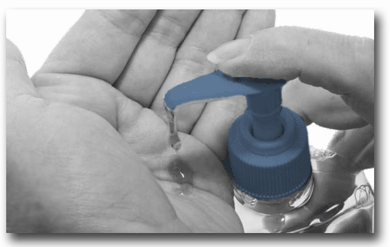infotx@cpt.eurofinsus.com |
(512) 243-6426
ASTM E1838 Determining the Virus-Eliminating Effectiveness of Hygienic Handwash and Handrub Agents Using the Fingerpads of Adults

The ASTM E1838 test evaluates the effectiveness of Handwash and Handrub formulations for inactivating and/or mechanically removing transient viruses from the hands of health-care workers. The method can be used to test antimicrobial or non-antimicrobial products. Typically, fingerpads which have been contaminated with a viral inoculum suspension are exposed to a handwash or handrub product, and the efficacy of the product is determined. This method may also be adapted to be used with animal pathogenic viruses or bacteriophages.
ASTM E1838: Procedure At a Glance
This test is conducted on at least three healthy study participants with undamaged skin who have not used any antimicrobial products for at least one week before testing.
Each subject washes their hands with a non-antimicrobial soap for at least ten seconds and then rinses and dries their hands. The hands are further pre-cleaned using a 70% ethanol cleansing process. After defining an area on each finger pad, a test virus suspension, with or without a soil load, is used to contaminate the pads with at least 104 infectious units. Test viruses that may be evaluated include Human Adenovirus, Hepatitis A Virus, Human Rotavirus, Rhinovirus, and Norovirus (Note: Feline Calicivirus is an approved surrogate for Human Norovirus). The initial contamination level is measured by determining the amount of virus deposited on each thumb pad prior to drying.
For the actual test measurements, the suspension is allowed to dry on each of the finger pads. The contaminated fingerpad areas are then exposed either to a control or to a handwash/handrub product following a defined process. For handwash testing, there is a simulated water rinse step. This step is not used for testing handrub products. The microorganisms surviving on the fingerpads are collected via extraction and the eluates are assayed following standard procedures. Cell culture, virus susceptibility, cytotoxicity, and interference controls are included in this procedure. The baseline and test substance virus levels are compared and the reduction of the virus level that can be attributed to the use of the handwash or handrub product is reported. Note that this test method is not designed to be used to evaluate the effectiveness of surgical hand scrubs or preoperative skin preparations.
ASTM E1838: EUROFINS CRL’S EXPERTISE
Eurofins CRL was founded in 2017 as a collaborative effort between two specialty contract testing facilities. ECRL combines the expertise derived from its legacy with the innovative methods and quality focus that makes the Eurofins name a leader in third-party testing world-wide.
Eurofins CRL Is:
A contract testing laboratory designed to support the hand hygiene and infection control industry. Testing is carried out in compliance with current FDA, Good Laboratory Practice (GLP), and Good Clinical Practice (GCP) regulations by skilled, experienced microbiologists and chemists, to quickly meet your project testing goals.